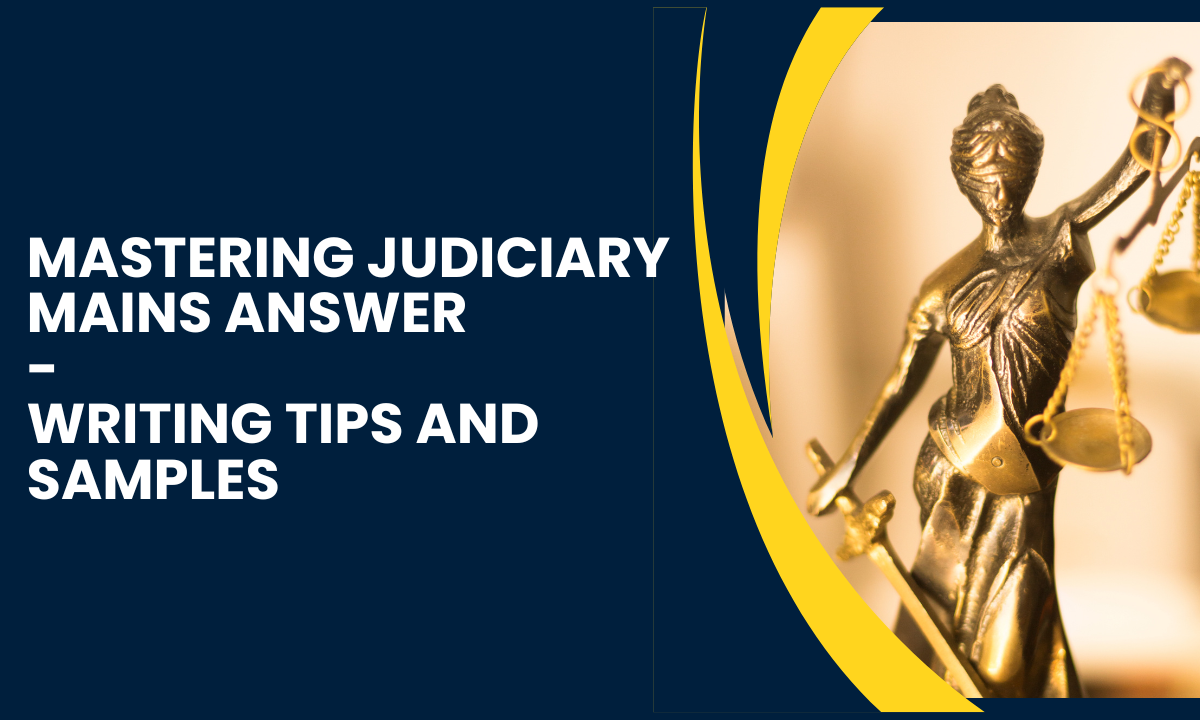+91 9990898327
Office : 632, Dr. Mukherjee Nagar, Delhi 110009
Mon-Sun: 09:00AM - 08:00PM

Mastery of answer writing for the Judiciary Mains exam is a key to success of a candidate. The Mains exam does not only check your legal knowledge, but also your skill of communicating and presenting such knowledge. It demands rigorous preparation, systematic organization, and regular practice. This guide talks about prominent tips and offers sample templates in order to improve answer-writing skills for the Judiciary Mains Exam 2025.

Start your preparation with a dual-focus Approach- Demonstratively preparing for strategy towards both Prelims as well as Mains. Integrated preparation makes one understand the subjects thoroughly so that easy switching between objective and descriptive types of questions becomes feasible. With less time gap between the two phases, parallel preparation is now the trend. e.g. - While preparing for IPC, don’t just remember sections for MCQs; also practice answer writing.
Self-note-making allows better understanding and memory retention. Have emphasis on writing short notes based on major points, legal provisions, and precedents of SC. Your own notes assist when revising and help quick recall when preparing for the exam. Use colour codes to differentiate types of content in your notes.
Recalling portions is needed but with it the need to learn underlying concepts too. This combination assists you in applying the legal rules in their right perspective to different situations given in questions. Focus on understanding both letter & spirit of the Law.
During note-taking, especially mark major case laws and landmark judgments. They are authoritative sources in your answers, providing an overall understanding of the topic.
Make use of approved reference books in supporting your study for acquiring diverse ideas and up-to-date knowledge regarding complicated legal matters. In this way, the knowledge horizon is expanded and well-informed answers are delivered. Supplement with law commission reports.
A good answer enhances readability and understanding and brings out clarity of thoughts. Use the following format:
Introduction
Begin with a brief introduction that sets up the context of your response. This can involve defining terms or summarizing the involved legal issue.
Main Body
Legal Provisions and Concepts: Define pertinent legal provisions and how they pertain to the question.
Application and Analysis: Apply these provisions to the presented facts or situations and provide a logical argument.
Case Laws and Examples: Provide pertinent case laws and examples which support your argument, making sure that they match directly to the question.
Conclusion
Conclusion by summarizing your answer by restating the main points and writing a short closing remark that addresses the question effectively.
Use concise and clear language, avoiding unnecessary verbosity. Answer the question directly to remain focused.
Make sure your answer has a logical flow, with each point depending on the other. This coherence helps in presenting your argument effectively.
Maintain neat, legible handwriting. Organize your response with proper headings, subheadings, and bullet points to ensure it is easy to read.
Practice writing answers within a time limit to develop the skill of providing detailed answers quickly in the test.
If a word limit is mentioned, comply with it word for word. Otherwise, approximate depth in your response based on marks allocated and question difficulty level.
Terms like audi alteram partem, Nemo Judex causa sua etc.
Practice answer writing over and over again using past year question papers in order to become familiar with the examination pattern as well as question trends.
Question - Define the concept of 'Res Ipsa Loquitur' and how it applies in negligence cases.
Answer - The doctrine of 'Res Ipsa Loquitur' is Latin, literally meaning "the thing speaks for itself." It is a rule in a part law under the head of Negligence that allows Courts to presume Negligence whom the accident is of a kind that ordinarily does not occur without Negligence. of tort law that enables one to infer negligence from the nature of the accident, even in the absence of direct evidence.
This is where the accident would otherwise have not been had there not been negligence. This puts the burden on the defendant to prove there was no negligence on their part.

There are three things that must be met before 'Res Ipsa Loquitur' is applied:
The occurrence must be a type of occurrence which does not occur without negligence.
The agency which inflicted injury as cause must have been within the defendant's exclusive control.
The plaintiff cannot be the cause.
In Byrne v. Boadle (1863), a barrel falling from a warehouse injured the plaintiff. In accordance with the court, barrels fall not when there is no negligence, so it depended on 'Res Ipsa Loquitur.'
The doctrine of 'Res Ipsa Loquitur' is an important tool in cases of negligence, where the courts are able to infer negligence where direct evidence is absent but facts unequivocally point to fault.
Following these tactics and making genuine attempts will help the candidates improve their answer-writing skills, thus scoring well in the Judiciary Mains exam.
Post a comment